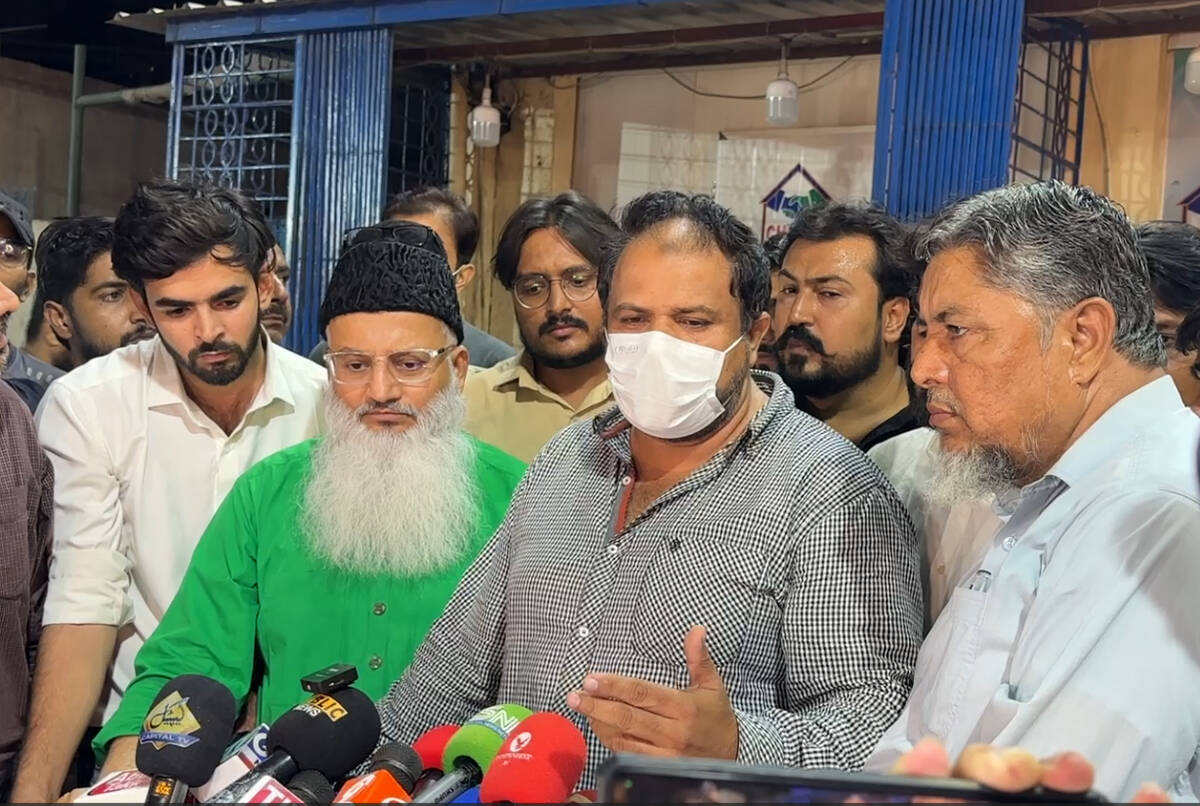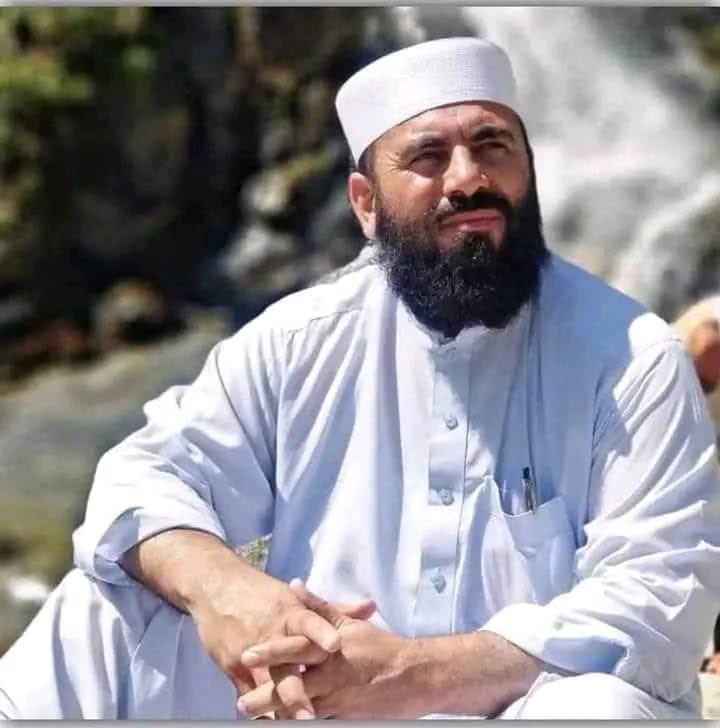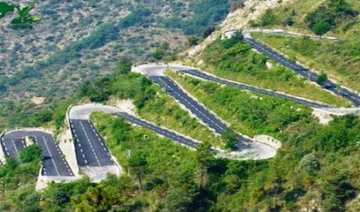BADSWAT: When a glacial lake burst in Pakistan's northern Gilgit-Baltistan province in July, Sher Baz watched helplessly as the waters swept away his family home.
Residents of Badswat village, which lies in Ishkoman valley at the foot of the Hindu Kush mountain range's snow-capped peaks, were at the mercy of the flash flood that carried off homes, roads and bridges, as well as crops and forest.
"Thank God we are alive, but everything we owned was washed away by the floods when the glacial lake burst," said Baz, a 30-year old father of four.
Although there are several glaciers near Badswat village, residents said this was the first glacial outburst in living memory. The authorities said the timely evacuation of villagers meant nobody had died.
Baz said the event had left him feeling stranded.
"Surrounded by mountains and muddy water, it seems we are living between life and death," he told the Thomson Reuters Foundation.
GLACIER CENTRAL
Pakistan has more glaciers than any other country outside the polar region – more than 7,200 in the Karakoram, Himalayan and Hindu Kush ranges, according to the Pakistan Meteorological Department (PMD).
They feed the Indus River system, the country's water lifeline. But data gathered over the last 50 years shows that all but about 120 of the glaciers exhibit signs of melting, due to rising temperatures, meteorological officials said.
As the glaciers retreat, they leave behind lakes supported by ice dams or accumulations of rock and soil. Inherently unstable, these dams often burst, sending huge volumes of water rushing into the villages below them.
"With glaciers melting faster than before, we feel more vulnerable and it seems like we are under constant threat of a natural disaster," said another villager Shakoor Baig.
While he is used to coping with floods, the 45-year-old farmer said he had not seen anything on this scale.
Baig, who lost his home, crops and fields, joined nearly 1,000 residents in Badswat village who were evacuated to higher ground, where some are living in temporary shelters.
Trapped between mountains, receding waters and damaged roads, providing residents with enough food and tents has been difficult, said local relief group the Aga Khan Agency for Habitat, which worked with the Pakistani army to air-drop aid.
FOREST LOSS
Such events are just the start, said glacier expert and PMD head Ghulam Rasul.
"The disasters caused by glacier outbursts in these areas will not stop here. They will continue in the future because there are so many glaciers at risk of bursting," he told the Thomson Reuters Foundation.
Years of deforestation, combined with climate change, have led to a spike in temperatures in the region, which has caused glaciers to melt, Rasul said.
Over the past 80 years, he said, the average temperature in Gilgit-Baltistan has increased by 1.4 degree Celsius (2.5F) compared to a rise of 0.6 degree Celsius (1F) in the lower-lying regions of Sindh, Punjab and Khyber-Pakhtunkhwa.
Poor government management of forests and increased demand for timber have seen trees cut down, he said - even though conserving forests is essential in order to absorb carbon emissions and fight climate change.
"Global warming has direct implications on mountainous areas in northern Pakistan because of forest loss. Deforestation happened due to the negligence of authorities since people would cut trees for construction and fuel," Rasul said.
"The essential thing to do is to grow more forests to mitigate the effects of global warming on glaciers in future."
Local authorities said rejuvenating the forest is a priority, but replenishing the area would take time.
"The provincial government has already launched a campaign to grow the forest, among other solutions, to offset the rapid increase in temperatures in these mountains," local government spokesman, Faizullah Faraq, told the Thomson Reuters Foundation.
With help from the U.N. International Fund for Agricultural Development (IFAD), Faraq said, the authorities were also developing infrastructure in nearby areas in case residents of vulnerable villages were forced to relocate.
"This is a big challenge and not a matter to resolve overnight, but we are moving in that direction," he said.
Rasul said the PMD had installed early warning systems in three areas to notify vulnerable communities of any glacial threats, adding that more were needed so to provide sufficient advance warning ahead of the next event.
And, he said, the PMD recommends that communities be better trained in coping with emergency situations.
Meantime all that villager Baz can do, he said, was pray that his family would survive another day.
"I worry about the future and how to feed my family, since I lost my land and my job ended too. I pray that God will save us from more natural disasters," he said.
Villagers 'living between life and death' as Pakistan's glaciers melt
Villagers 'living between life and death' as Pakistan's glaciers melt

Brother claims body of Pakistani actress Humaira Asghar Ali, denies family disowned her

- Actor’s brother says family searched for her months ago but lost contact
- Culture ministry had offered to arrange burial after initial reports of family refusal
KARACHI: The brother of Pakistani actress and model Humaira Asghar Ali, whose decomposed body was discovered in her Karachi apartment this week, collected her remains on Thursday and rejected widespread media reports claiming the family had disowned her.
Ali’s body was found on Tuesday when a court bailiff arrived at her rented flat in Karachi’s upscale Ittehad Commercial area to vacate the property following a complaint by the landlord. A post-mortem conducted by Karachi Police Surgeon Dr. Summaiya Syed indicated the body had decomposed for more than a month, but further forensic investigation suggests Ali likely died in October 2024, nearly nine months ago.
Police initially said Ali’s family had declined to claim her body, prompting Sindh’s Minister for Culture and Tourism, Syed Zulfiqar Ali Shah, to announce that the provincial government would arrange her last rites. Sindh Governor Kamran Tessori also offered to assist with the burial.
However, Naveed Asghar, the deceased actor’s brother, arrived from Lahore to claim her remains from the Chhipa morgue. Speaking to reporters before leaving for Lahore, Asghar refuted reports that the family had refused to take responsibility for his sister’s burial.
“We have come here and after fulfilling all the legal requirements, have received the dead body,” Asghar said.

Asghar said his sister moved to Karachi from Lahore seven years ago on her own accord and had distanced herself from the family, telling their father that she was “responsible for my own affairs.” She would visit their home once every six months to a year but had not been in touch for the past year and a half.
He added that the family had attempted to trace Ali about six months ago but her phone numbers were switched off and she had never shared her exact address. When they contacted one of her friends, they were told that she “did not know the actress.”
“Then when this incident happened, we were suddenly shocked, especially since there was already a situation at home with our paternal aunt,” Asghar said, referring to an aunt who had died in a recent road accident. He explained that the stress of persistent calls from reporters had added to their grief.
“That is why my father said that if there is any emergency, then you can bury her there [in Karachi],” Asghar said.
He also criticized sections of the media for focusing on the family’s absence rather than investigating the circumstances surrounding his sister’s death.
“Whatever matters took place with the landlord, did any of you interview him?” he asked reporters. “You created noise all over Lahore, across Pakistan, and even around the world. But we have come here to take our sister. There are certain formalities that the police have to complete, after which the body is handed over.”
The condition of Ali’s remains made the situation even more distressing. Dr. Syed, the Karachi police surgeon who conducted the post-mortem, said:
“Viscera completely autolyzed and reduced [to an] unidentifiable blackish mass. We have collected hair and specimen from [the] abdomen for chemical analysis. For positive identification, the blood sample of the brother has been collected.”
Ali rose to fame after winning the Veet Miss Super Model title in 2014 and appearing in the reality show Tamasha Ghar in 2022. She also featured in several television dramas, including Just Married, Ehsaan Faramosh, Guru, and Chal Dil Mere. On the big screen, she appeared in the 2015 action-thriller Jalaibee and in Love Vaccine in 2021.
Pakistan’s national airline concludes month-long post-Hajj flight operation

- Pakistan International Airlines’ final post-Hajj flight arrived in Islamabad from Madinah, says airline
- PIA says repatriated over 41,500 pilgrims in total since June 10 using Boeing 777, Airbus A320 aircraft
KARACHI: Pakistan’s national flag carrier announced concluding its month-long post-Hajj flight operation on Thursday, saying it had repatriated 41,500 pilgrims since June 10 from Saudi Arabia.
Pakistan concluded its 33-day pre-Hajj flight operation in May, transporting more than 115,000 pilgrims to Saudi Arabia under both the government and private schemes for the annual Islamic pilgrimage. The Pakistan International Airline (PIA) began its post-Hajj flight operation on June 10.
The final post-Hajj flight operated by PIA arrived in Islamabad from Madinah at 8:30 p.m. on Thursday, the national airline’s spokesperson said in a statement.
“In total, over 41,500 pilgrims were repatriated to Pakistan via 147 flights operated by PIA,” the spokesperson said. “PIA maintained an on-time departure rate of over 90 percent for its Hajj flights.”
The airline said its post-Hajj operation was conducted from Pakistan’s Karachi, Lahore, Islamabad, Quetta, Multan and Peshawar cities. The airline used its Boeing 777 and Airbus A320 aircraft for the operation.
“Pilgrims expressed satisfaction with the arrangements made by PIA,” the airline’s spokesperson said.
Pakistan has already started the registration process for Hajj 2026, with over 313,000 individuals completing the process. Intending pilgrims can register for the annual Islamic pilgrimage next year through the religion ministry’s online portal and 15 designated banks.
Pakistan has extended the deadline to register for Hajj 2026 till July 11.
Awami National Party leader killed as militant violence escalates in northwest Pakistan

- Another person with ANP’s Maulana Zeb Khan shot dead by unidentified militants, says CM Office
- ANP spokesperson Ihsan Ullah pays tribute to Khan, says he spoke out against militants frequently
ISLAMABAD: Two people, including a senior leader of the Awami National Party (ANP), were shot dead by unidentified assailants in Pakistan’s northwestern Khyber Pakhtunkhwa (KP) province on Thursday, the chief minister’s office said.
Maulana Zeb Khan, a leader of the Awami National Party (ANP), was shot dead along with another person in KP’s Bajaur tribal district by unknown persons, the chief minister’s office said. English language newspaper Dawn quoted police as saying that the politician was shot dead in Bajaur’s Shindai Mor while campaigning for a peace parade scheduled for July 13 when he was attacked.
ANP spokesperson Ihsan Ullah paid tribute to Khan, saying he frequently spoke out against militants and was a key member of the party, serving as its central secretary of ulema affairs.
“Two people, including Maulana Khan Zeb, were killed in Bajaur in a firing incident by unidentified assailants,” KP Chief Minister’s Office said in a statement, adding that Chief Minister Ali Amin Gandapur condemned the incident.

The KP chief minister directed authorities to prepare a report on the incident and ordered immediate action against those responsible for Khan’s killing.
The incident takes place amid an alarming surge in militant attacks, especially in KP’s tribal districts such as Bajaur, in recent years. Despite past military operations, recent attacks on security forces, clerics and politicians highlight growing instability in the area.
No group has so far claimed responsibility for the incident. However, suspicion is likely to fall on the Tehreek-e-Taliban Pakistan (TTP) outfit that has launched some of the deadliest attacks targeting law enforcers, politicians and civilians since 2007.
Pakistan says Afghanistan-based militant groups launch attacks inside Pakistani territory, a claim Kabul has strongly denied. Islamabad also blames New Delhi for funding and arming these militant groups, which India also denies.
Pakistan police detain eight Sindh building authority officials after Karachi building collapse

- Twenty-seven people died when dilapidated building in Lyari collapsed last Friday
- Incident exposes issue of unsafe housing in city home to over 20 million people
KARACHI: Eight officials of the Sindh Building Control Authority (SBCA) and the owners of a building that collapsed in Karachi last week have been detained in connection with the incident, Pakistani police said on Thursday.
A five-story residential building, Fotan Mansion, collapsed last Friday around 10 am in the impoverished Lyari neighborhood of Karachi, trapping dozens under the rubble and prompting a large-scale rescue operation. Rescue officials recovered 27 bodies from the rubble after three days.
The collapse of the dilapidated building once again exposed the persistent issue of unsafe and poorly regulated housing in Karachi, Pakistan’s most populous city, which is home to over 20 million people. The rapid urbanization and weak enforcement of building codes have put countless residents at risk.
“We have detained eight officials of the SBCA and the owners of the building in connection with the first information report regarding the building collapse in Lyari,” Senior Superintendent of Police (SSP) City Arif Aziz told Arab News.
The complaint was registered under criminal sections covering public servant misconduct, negligence in building safety, unintentional death, intentional bodily harm and property damage. These offenses carry penalties ranging from fines and short-term imprisonment to financial compensation and long-term jail.
Sindh Chief Minister Murad Ali Shah suspended Director General SBCA Ishaque Khuhro and ordered an inquiry over the incident on Monday.
He also directed the SBCA to carry out safety inspections of all buildings in the city. The Sindh government announced Rs1 million ($3,513) in compensation for the families of the 27 victims.
Many of the building’s occupants were members of the low-income Hindu minority community, and residents estimated that around 40 people were inside when the structure collapsed.
Fotan Mansion had been declared unsafe three years ago, according to the SBCA. This incident is the latest in a series of deadly building collapses in Karachi.
In February 2020, a five-story building in Rizvia Society collapsed, killing at least 27 people. The following month, another residential structure in Gulbahar came down, claiming 16 lives.
In June 2021, a three-story building in Malir collapsed, resulting in four deaths. Just last year, in August, a building collapse in Qur’angi killed at least three people.
Pakistan delegation concludes UAE visit under governance exchange program

- Meetings focused on digital governance, tax reform and service delivery
- Delegation seeks to adopt UAE best practices in innovation, institutional performance
ISLAMABAD: A high-level Pakistani government delegation on Thursday concluded an official visit to the United Arab Emirates as part of a program aimed at sharing knowledge and best practices in governance and public sector modernization.
The delegation, led by Bilal Azhar Kayani, Pakistan’s Minister of State for Finance and Railways and Head of the Prime Minister’s Delivery Unit, participated in the UAE Government’s Experience Exchange Programme (EEP). The initiative is aligned with Pakistani Prime Minister Muhammad Shehbaz Sharif’s wider push for institutional reform and better service delivery across the country’s public sector.
During the visit, the eight-member team held detailed sessions with senior UAE officials to learn about digital governance, tax system modernization, leadership development, and innovation in public service.
“Kayani expressed gratitude to the UAE Government for facilitating valuable knowledge-sharing engagements in areas such as digital governance, public service delivery, and tax system modernization,” the Pakistan Embassy in Abu Dhabi said in an official statement.
On the final day of the program, the Pakistani delegation met senior Emirati officials including Mohammad Al Sharhan, Managing Director of the World Governments Summit, Khalid Ali Al Bustani, Director General of the UAE Federal Tax Authority, Saeed Al Eter, Chair of the UAE Government Media Office, Dr. Waleed Al Ali, Secretary General of The Digital School and Khalfan Belhoul, CEO of Dubai Future Foundation.
The sessions focused on the UAE’s approach to future foresight, media communication, and performance management in governance.
Kayani “underscored Pakistan’s commitment to adopting global best practices in digital governance, efficiency, and public sector competitiveness to enhance service delivery and institutional performance,” the statement added.
The visit builds on a Memorandum of Understanding signed on June 16, 2025, between the UAE Ministry of Cabinet Affairs and Pakistan’s Ministry of Planning, Development and Special Initiatives. The agreement aims to strengthen cooperation in governance excellence and institutional capacity-building.
The UAE is one of Pakistan’s largest trading partners and an important source of foreign remittances, with more than 1.7 million Pakistani expatriates living and working in the Emirates. According to Pakistan’s Bureau of Emigration and Overseas Employment, the UAE is the second-largest destination for Pakistani migrant workers after Saudi Arabia.
In recent years, bilateral trade has grown steadily, reaching nearly $10 billion in 2024, driven by energy imports, textiles, and other goods. Pakistani workers in the UAE sent home over $5 billion in remittances last fiscal year, providing vital foreign exchange for the country’s economy.
The two countries maintain close ties in investment, defense cooperation, and people-to-people exchanges, underpinned by shared commitments to economic development and regional stability.











